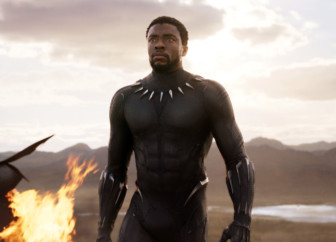
“Black Panther,” the newly released Marvel production, is excellent. At a sold-out opening-night showing (the movie is poised to break all sorts of box-office records), the extremely young, extremely excited audience clapped and cheered throughout. Yet good or bad (happily, very good), it still would have been accurate to state the following: Black Panther is a triumph.
The first superhero movie to feature an almost entirely black ensemble cast is a grand success in a year already full of victories for the representation of people of colour in art, media and public life. From the Houston-trained Nigerian bobsled team to the diverse casting of the Ava DuVernay- directed A Wrinkle in Time to the swearing in of the most racially diverse Congress in history, people of colour have celebrated. These advances are worthy of outsize commemoration — regardless of what the critics think. The unexpected result of the 2016 election was seen by many — by many white people, especially — as a sign that “identity” had run its course as a force in America. The Democrats focused on race and failed to gain the presidency. Today, aren’t we all Americans? Can’t we finally be colour-blind? Isn’t taking note of race a losing game?
Since then, this rejection of “identity” — usually by those whose identity remains the American default — has morphed into general annoyance whenever the question of race appears to get undue prominence in any discussion. It would be a travesty to make biracial actress Meghan Markle’s engagement to Prince Harry “all about race,” the thinking goes. The excitement about Marvel’s groundbreakingly Africa-centric production? Completely overblown. In fact, such triumphs — and these two examples are triumphs, for the people involved and for society as a whole — are worth celebrating particularly because they have to do with race. Identity is not dead, as the incredibly identitarian Trump administration has made quite clear. Because of, and in spite of, an increasingly divided racial climate, the representation of people of colour in broader spaces matters.
This cannot be understated. Imagination shapes belief, and belief shapes action. The ways in which we are encouraged to imagine ourselves shape what we believe we can become. And, of course, what we believe shapes who we are. It does matter that a little black girl can now more easily imagine herself a princess. It is powerful that a young black man has the opportunity to see himself as a king or a superhero — not just as a villain or a criminal. By historical default, most presidents and chief executives, movie stars and models, Olympians and directors, have been white. But for the rest of us, seeing ourselves in such roles for the first time can be a shock, a delight and an inspiration. Michelle Obama observed as much, after the National Portrait Gallery’s unveiling of the official portraits of the former president and first lady: Barack Obama was painted by Kehinde Wiley, Michelle Obama by Amy Sherald. The artists who painted the first African-Americans in the White House were themselves the first African-Americans ever commissioned to paint official presidential portraits.
On Instagram, Michelle Obama wrote: “As a young girl, even in my wildest dreams, I never could have imagined this moment. . . . This is all a little bit overwhelming, especially when I think about all of the young people who will visit the National Portrait Gallery and see this, including so many young girls and young girls of colour who don’t often see their images displayed in beautiful and iconic ways. I am so proud to help make that kind of history.” That this kind of history is only now being made reflects the unfortunate truth that this level of representation is still new. Perhaps the greater triumph to come will be making such instances commonplace. Is it this prospect that causes the dismissive critics such discomfort? The election of one black president was shock enough to cause a resurgence of white-supremacist groups across the United States. As more faces of colour become visible in formerly unchallenged spaces, whether as state leaders or leading ladies, the more our country’s narratives of white superiority and black inferiority are turned on their heads. The more normal it is to see people of colour in spaces of power, the harder it will be to sustain the assumptions - and justify policies - that enforce America’s greatest and most terrifying fiction: that there must always be someone to look down upon, that people of colour must necessarily be second class. The destruction of that notion will be the greatest triumph of all.
— Washington Post
Christine Emba is an opinion columnist and editor for The Post.










